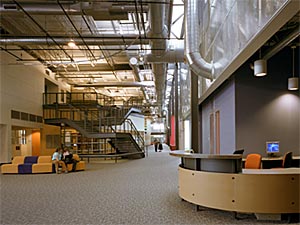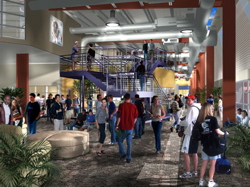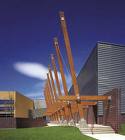The Denver School of Science and Technology
 The Denver School of Science and Technology is located in Denver, Colorado. The high school serves the students primarily from Denver public schools. Since opening in 2004 the mission of DSST is to provide an outstanding liberat arts education for all attending students.
The Denver School of Science and Technology is located in Denver, Colorado. The high school serves the students primarily from Denver public schools. Since opening in 2004 the mission of DSST is to provide an outstanding liberat arts education for all attending students.
Technology is Everywhere!
By Mark Inglis, Director of Technology
There are two pivotal assumptions that drive and undergird DSST's (Denver School of Science and Technology) use of technology that are expressed every day at DSST. The first is that the foremost characteristic of any educational environment that promotes learning is a quality school culture. Without that, technology will be as ineffective as any other pedagogical tool, and perhaps more so. The second is that technology must build, support, enable and enhance high quality teaching, instruction and administration. After these assumptions, then flows DSST's Technology Vision, toward which we strive: Technology must transform the educational process."
Technology must not be a simple replacement of non-technological methods of learning. It is too expensive to be a substitute for the pencil and the chalkboard. Instead it must invite and enable higher order thinking, more creative thinking, learning and expression. It must engender more intense investment and engagement by the student. It must be more effective than traditional means and enable collaboration, extrapolation, projection, analysis, demonstration, and closer, tangible interaction with the subject under study that is extremely unlikely or even impossible without it. It must transport the student to places, experiences, modes of thinking, cultures, and people otherwise impossible to reach for the normal high school student.
 Despite its name, DSST is a liberal arts school, "with a science and technology focus." As such, we believe that technology should empower and enable, and never replace or reduce the central human role of the teacher in a liberal arts education. The role of a liberal arts education is to enable and facilitate the creation of leaders who value community, individuals and the creation of a truly human society. Technology must serve this end.
Despite its name, DSST is a liberal arts school, "with a science and technology focus." As such, we believe that technology should empower and enable, and never replace or reduce the central human role of the teacher in a liberal arts education. The role of a liberal arts education is to enable and facilitate the creation of leaders who value community, individuals and the creation of a truly human society. Technology must serve this end.
DSST's infrastructure consists of file, print, e-mail, backup and application servers, as well as Cisco network switches and access points all supporting a totally wireless laptop/tablet environment. DSST also takes advantage of a DS3 Internet connection as well as voice over IP (VoIP) telephone communications. Thanks to a unique partnership with Hewlett Packard (HP), DSST is the first public high school in Colorado where every student uses wireless networked laptops. This eliminates the "digital divide" and enables students to be able to operate at a very high technology level, both at school and at home.
During the fall of 2007, renowned educational technology consultant, Andy Zucker, conducted an in-depth study of DSST's 1-to-1 program. The results of that study confirm the value of DSST's technology as part of its overall strategy for student learning and teacher effectiveness. In addition to the study, DSST has undertaken a TCO (Total Cost of Ownership) study to round out the picture of technology at DSST. The 1-to-1 study is available now on our website (http://scienceandtech.org), and the TCO study will be available there soon.
So what does this learning look like at DSST? As with any 1-to-1 school, when you walk in before our daily morning meeting (MM), you will see kids littered everywhere with laptops or tablets open. Some will be hurriedly working on their math or English homework (they get an hour or more of "CP" (College Prep) after school if they aren't ready with quality work by class time), others will be playing games or checking out YouTube. Besides announcements and suspension apologies, MM will often contain short digital presentations from students, staff or outside presenters.
Besides attendance and grading, teachers and staff track CP, other disciplinary actions, fees, and all equipment in's and out's on a custom database. After advisors have entered comments, this database delivers a "culture" report card, as well as the traditional grades.

Different classrooms will use their laptops or tablets differently and to varying degrees. A trip into one English classroom will find some students viewing a Camtasia video, while others are engaging in a classroom discussion with most computers closed and one student or the teacher recording notes on the discussion in OneNote that will then be posted either on Moodle or our shared file server for access by all. This maintains the focus on the discussion while still allowing everyone access to the shared results.
Prep
Academy students (Grades 9/10) all have laptops, while Senior Academy students (11th/12th) use tablets, as do all the teachers. Each classroom contains a projector and access panel. Most teachers use this some or all of their class period, interspersed with student sharings, presentations or other contributions. Teachers regularly use the "inking" capabilities of the tablets for their demonstrations & instruction, often saving those to shared spaces for student access and review. It is school policy that all students have digital access to homework assignments and necessary resources. Between this and web access to the district's grading web portal (Infinite Campus), complete with email links to all teachers and staff, parents can and do maintain an almost complete picture of what is going on in their student's education. Even our voicemail is forwarded to teachers' email via wav files, so many teachers do virtually all of their communication from their computer.
 One of the hallmarks of DSST's culture is that we are all learners. As such, we are constantly examining what we are doing and evaluating how well we are doing it. Multiple performance reviews, including 360 degree feedback, for ourselves, and rigorous student assessment provides data that we analyze frequently and scrupulously. ExamView assessment software allows us to tie each exam to specific and fairly detailed standards and benchmarks and break results out by any number of parameters. Instant or nearly instant feedback provided to students, teachers and administrators allows each level to examine, reevaluate, re-strategize, and review or re-do what has been done. The software allows a teacher to set up assignments, quizzes, etc. that are not only self-administered, but can contain layers of helps and hints for independent study and review. Teachers, classes, demographics, small groups, even structures, pedagogies and schedules can be evaluated for effectiveness.
One of the hallmarks of DSST's culture is that we are all learners. As such, we are constantly examining what we are doing and evaluating how well we are doing it. Multiple performance reviews, including 360 degree feedback, for ourselves, and rigorous student assessment provides data that we analyze frequently and scrupulously. ExamView assessment software allows us to tie each exam to specific and fairly detailed standards and benchmarks and break results out by any number of parameters. Instant or nearly instant feedback provided to students, teachers and administrators allows each level to examine, reevaluate, re-strategize, and review or re-do what has been done. The software allows a teacher to set up assignments, quizzes, etc. that are not only self-administered, but can contain layers of helps and hints for independent study and review. Teachers, classes, demographics, small groups, even structures, pedagogies and schedules can be evaluated for effectiveness.
A couple of things that some find surprising upon visiting DSST; you won't find a lot of bells and whistles programs here. While our filmmaking elective continues to be popular, and there are a lot of Senior Projects (that's a whole other story) that involve video, we don't have our own television show or studio. DSST is all about basic education. Our aim is 100% acceptance to a four year college for all of our students. Right now, we project that 97% of our first graduating class of 2008 will in fact go off to a four year college or university after high school graduation. The other surprise for some is that we have a very small technology track. Freshmen get a two week orientation to technology then one hour a week throughout their freshman year. Students have room for one of our assorted technology electives each trimester during their 10th and 11th grade years. Students then have the ability to take either an AP or non-AP programming course (Java) their senior year.
DSST has a very strong science and engineering program, with Physics taught the freshman year, and advanced physics offered the senior year. All students end up with five years of science and they take either an advanced engineering/physics or biology course their senior year.
So, where, some may ask, is the "technology" in the Denver School of Science and Technology? Everywhere!
Mark Inglis is the Director of Technology at the Denver School of Science and Technology. He can be reached at Mark.Inglis@scienceandtech.org
To read the next Global Story click here






